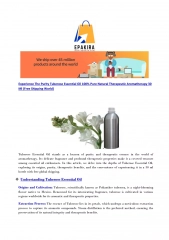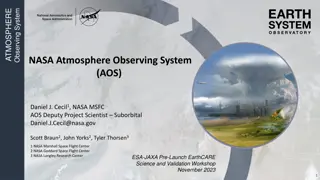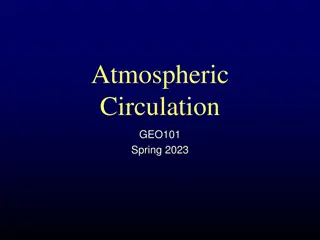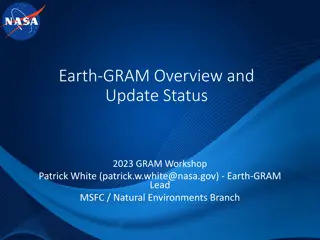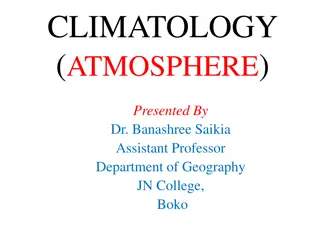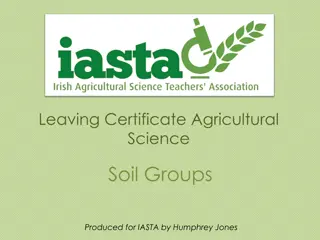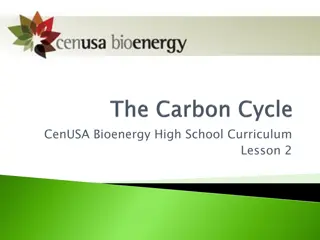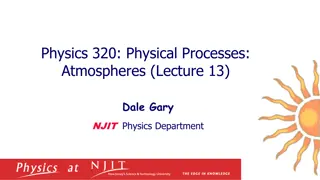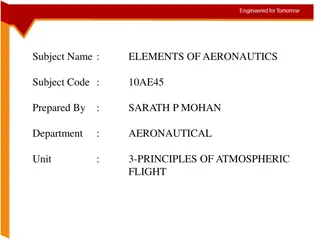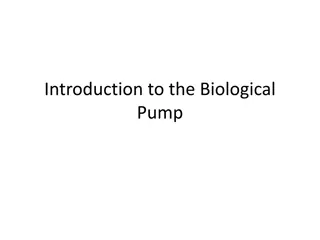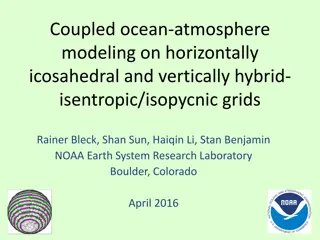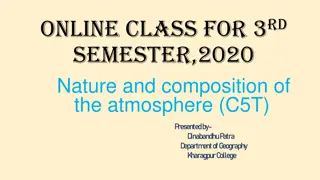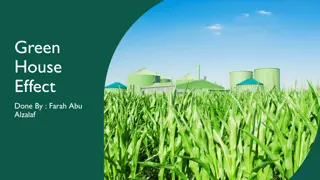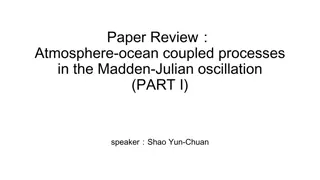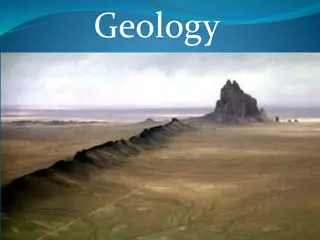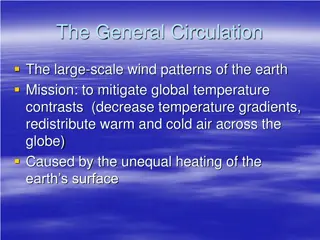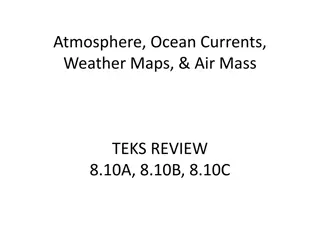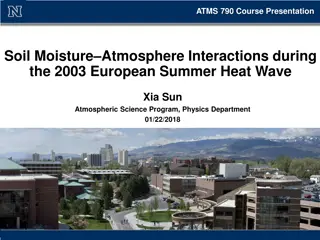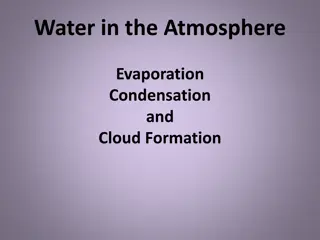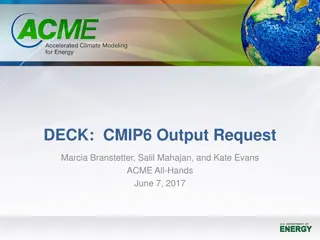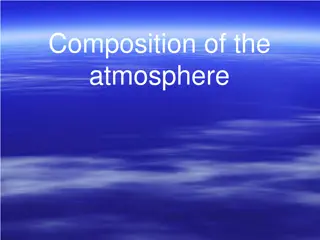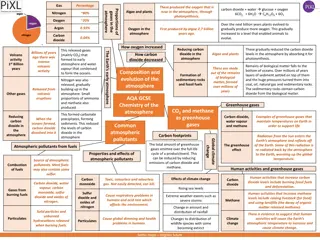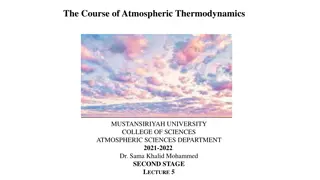Experience The Purity Tuberose Essential Oil Pure Therapeutic Aromatherapy 30 Ml
Health Benefits of Tuberose Essential Oil\n\nThe various medicinal properties of this essential oil are as follows.\n\nAphrodisiac: Justifying its romantic and sensual names that include \u201cNight Queen\u201d and \u201cMistress of the Night\u201d, this oil behaves as an aphrodisiac. It is commonly
0 views • 4 slides
Understanding Water Management: Principles, Practices, and Soil-Water Relations
Explore the principles and practices of water management in agriculture with a focus on water availability, nutrient relationships, and losses. Discover the physical classification of water, available water defined between field capacity and wilting point, soil water potential, and the soil-plant-at
6 views • 17 slides
Influence of Solar Activity and Orbital Motion on Terrestrial Atmosphere
Solar magnetic field reversal, wavelet spectral analysis, and proxies for solar activity index are discussed in relation to the joint effects of solar activity and solar orbital motion on the Earth's atmosphere. The study highlights the impact of solar cycles on terrestrial climate dynamics and temp
6 views • 16 slides
The Role of Sunlight, Ozone, and Plant Life in Earth's Atmosphere
Sunlight plays a crucial role in the formation of ozone from oxygen, leading to the protection of plant life against harmful UV radiation. The ozone produced by sunlight helps in the photosynthesis process of plants, which in turn release oxygen, absorb CO2, and contribute to the overall balance of
7 views • 23 slides
Global and Local Winds
Global and local winds are created by differences in air pressure due to unequal heating of the atmosphere. Wind formation involves the movement of air from high to low pressure areas, influenced by factors like the Coriolis effect. The composition, structure, and properties of the atmosphere play c
9 views • 34 slides
NASA Atmosphere Observing System (AOS) Overview
NASA's Atmosphere Observing System (AOS) comprises innovative technologies and instruments to study aerosol, cloud, convection, and precipitation processes. AOS includes the AOS-Storm and AOS-Sky missions, utilizing various sensors like radars, lidars, radiometers, and polarimeters to address key at
1 views • 13 slides
Understanding Earth's Water Cycle and Atmospheric Processes
Explore the intricate workings of Earth's water cycle and atmospheric processes, including the distribution of water across various reservoirs, the significance of humidity in the atmosphere, and the influence of temperature on water vapor content. Gain insights into global wind patterns, pressure s
2 views • 42 slides
Why Flowers Are Essential for Creating a Beautiful Wedding Atmosphere
Wedding flowers have an undeniable charm that can transform any venue into a magical setting. From bouquets to centerpieces, flowers play a vital role in creating a beautiful and romantic atmosphere for your special day. Their symbolism, colors, and fragrance all contribute to the overall ambiance o
0 views • 4 slides
Earth-GRAM Overview and Updates 2023
Earth-GRAM is a global reference atmospheric model providing monthly mean and standard deviation data for various atmospheric variables. It is used in engineering for dispersion simulations but is not a forecasting model. Updates to Earth-GRAM include the Modern Era Retrospective Analysis, a global
0 views • 19 slides
Understanding Atmosphere Composition and Structure in Climatology
The study of climatology, focusing on the atmosphere, is presented by Dr. Banashree Saikia, covering topics such as atmospheric composition, insolation, temperature variations, atmospheric pressure, wind systems, atmospheric moisture, climatic classification, cyclones, and monsoons. The atmosphere,
1 views • 9 slides
Overview of Soil Groups in Agricultural Science
The Leaving Certificate Agricultural Science delves into various soil groups in Ireland, including Podzols, Brown Earths, and more. The classification of soils helps determine their best use in different areas, showcasing their characteristics and potential productivity. The study highlights the imp
0 views • 18 slides
Eerie Atmosphere: Unveiling Mysterious Settings
Dive into the world of creating atmosphere and tension in writing by exploring the use of descriptive language, figurative expressions, and sensory details. Learn how to craft a mysterious and spooky atmosphere in a story through vivid descriptions and emotive vocabulary, as exemplified in a deserte
0 views • 6 slides
Understanding Environmental Hygiene: Air Pollution and Composition of Air
The content delves into the concept of atmospheric pollution, the composition of pure and impure air, sources of air pollution, and the zones of the atmosphere. It highlights the detrimental effects of pollutants on health and the environment, emphasizing the importance of environmental hygiene. The
1 views • 27 slides
Understanding Tone, Mood, and Atmosphere in Literature
Atmosphere, mood, and tone are essential elements in literature that shape the emotional tone of a literary work, influence reader expectations, and convey the author's attitude. They are interconnected yet distinct aspects that add depth and complexity to storytelling. This analysis delves into the
0 views • 12 slides
Understanding Carbon Movement in the Environment
Explore the intricate processes of carbon movement in the biosphere, atmosphere, oceans, and geosphere. Learn how plants absorb carbon dioxide, animals utilize carbon for tissue building, and the impacts of human activities like burning fossil fuels on carbon distribution. Discover the critical role
0 views • 6 slides
Understanding Atmospheric Physics: Ideal Gas Law and Maxwellian Distribution
Exploring the physics of gases in planetary atmospheres, this lecture delves into the ideal gas law which relates pressure, density, and temperature in an atmosphere. It introduces the concept of kinetic temperature and Maxwellian distribution, showcasing how gas particles distribute in equilibrium.
0 views • 12 slides
Understanding Gases and Plasmas in the Atmosphere
Delve into the concepts of gases and plasmas in the atmosphere, exploring topics such as fluid pressure, buoyancy, and the unique properties of gases compared to liquids. Discover how the balance between kinetic energy and gravity determines the thickness of our atmosphere and why it is essential fo
0 views • 25 slides
Principles of Atmospheric Flight in Aeronautics
This material covers essential topics in aeronautics including the physical properties of the atmosphere, standard atmosphere relationships, Mach number theory, lift and drag principles, stability, control, pressure and temperature variations based on location and solar activity, and the Internation
0 views • 22 slides
Understanding the Biological Pump and Carbon Cycle in the Ocean
The biological pump in the ocean involves photosynthesis by phytoplankton, which removes carbon dioxide from the atmosphere, and respiration, where some CO2 is released back. Phytoplankton are crucial in the ocean's carbon cycle, with primary consumers like zooplankton depending on them for energy.
0 views • 20 slides
Coupled Ocean-Atmosphere Modeling on Icosahedral Grids
Coupled ocean-atmosphere modeling on horizontally icosahedral and vertically hybrid-isentropic/isopycnic grids is a cutting-edge approach to modeling climate variability. The design goals aim to achieve a global domain with no grid mismatch at the ocean-atmosphere interface, with key indicators such
1 views • 21 slides
Understanding the Nature and Importance of Earth's Atmosphere
Earth's atmosphere is a vital component that supports life on our planet. It is a thin gaseous envelope surrounding Earth, providing essential elements for living beings. The composition and development of the atmosphere have evolved over billions of years. The atmosphere plays a crucial role in pro
3 views • 14 slides
Understanding Gases in the Earth's Atmosphere
Explore the composition and layers of the Earth's atmosphere, including the significance of gases like nitrogen, oxygen, water vapor, and carbon dioxide. Learn how human activities impact atmospheric composition and how changes in temperature and pressure affect weather predictions. Discover the rol
0 views • 13 slides
Understanding Tone and Mood in Writing
Explore the concepts of tone and mood in writing, how they are defined, and their impact on creating an atmosphere and eliciting emotions in the reader. Discover how tone reflects the author's attitude and the multiple tones that can exist in a piece of writing. Dive into the general atmosphere crea
0 views • 34 slides
Understanding the Greenhouse Effect and Its Impact
The greenhouse effect is the trapping of the sun's warmth in a planet's lower atmosphere, primarily by greenhouse gases like carbon dioxide and water vapor. These gases absorb and re-emit infrared radiation, which leads to an increase in temperatures. While carbon dioxide and water vapor are signifi
1 views • 13 slides
Understanding Atmosphere-Ocean Coupling in Madden-Julian Oscillation
Atmosphere-ocean coupled processes in the Madden-Julian Oscillation (MJO) play a crucial role in intraseasonal oscillations. This paper review by Shao Yun-Chuan explores how the ocean's Sea Surface Temperature (SST) influences surface fluxes, MJO convection, and energy balance dynamics. It delves in
0 views • 17 slides
Exploring the Fascinating World of Geology and Earth Sciences
Delve into the diverse field of geology, covering topics such as physical and historical geology, geochronology, mineralogy, petrology, and more. Learn about the solar nebula hypothesis and the Earth's lithosphere, hydrosphere, atmosphere, and biosphere. Discover the composition of Earth's atmospher
0 views • 12 slides
Understanding the General Circulation of Earth's Atmosphere
The general circulation of the Earth's atmosphere plays a crucial role in mitigating global temperature contrasts by redistributing warm and cold air. This system includes the Polar Cell at high latitudes, the Hadley Cell in the tropics, trade winds, oceanic heat distribution through Eckman Transpor
0 views • 13 slides
Atmosphere, Ocean Currents, Weather Maps, & Air Mass TEKS Review
Explore key concepts related to atmosphere, ocean currents, weather maps, and air mass in this TEKS review. Understand the factors contributing to Earth's uneven heating, the role of convection in ocean currents, the energy sources that drive ocean convection, and the effects of heating on air densi
0 views • 21 slides
Dutch Overshoot Day 2024: Living Like the Dutch Requires 4 Earths
Dutch Overshoot Day 2024 falls on April 1st, highlighting that if everyone lived like the Dutch, we would need 4 Earths to sustain our current lifestyle. This emphasizes the urgency for sustainable living practices to ensure a viable future for our planet.
0 views • 7 slides
Soil Moisture-Atmosphere Interactions in the 2003 European Summer Heat Wave
This presentation discusses the significant impacts of soil moisture-atmosphere interactions during the 2003 European Summer Heat Wave, highlighting the abnormally hot weather, pavement buckling, and high-pressure systems that contributed to the extreme conditions. The images and diagrams illustrate
0 views • 27 slides
Understanding the Hydrologic Cycle and Water in the Atmosphere
Exploring the intricate processes of evaporation, condensation, and cloud formation in the atmosphere, the hydrologic cycle's closed system, and the impact of global warming on Earth's water resources. Dive into the essential concepts of water absorption, redistribution of energy, humidity, and the
0 views • 18 slides
Understanding Earth's Atmosphere Composition and Layers
Earth's atmosphere is primarily composed of nitrogen and oxygen, with other gases like argon, CO2, and water vapor making up the remaining percentage. While the levels of nitrogen and oxygen remain constant, variable gases like water vapor fluctuate based on location and time. CO2 levels have been i
0 views • 53 slides
Understanding Air Composition and Pollution
The composition of the dry atmosphere by volume, primary and secondary pollutants, and the impact of human activities on air quality are discussed. Various gases present in the atmosphere, sources of pollution, and the belief that natural elements are clean until polluted are explored. Different nat
0 views • 31 slides
Explore Our Solar System: Planets, Moons, and More
Delve into the wonders of our solar system, from Mercury, the closest planet to the Sun, to Jupiter, the largest planet with its multitude of moons. Learn fascinating facts about each planet's unique characteristics, including their distances from the Sun, lengths of days and years, and intriguing f
0 views • 15 slides
Understanding Earth's Atmosphere: A Detailed Overview
The Earth's atmosphere is a vital layer of gases that encircles our planet, providing the necessary conditions for life to thrive. It consists of several distinct layers, each with unique characteristics and functions. From the troposphere closest to the surface to the thermosphere extending to grea
0 views • 29 slides
CMIP6 Output Requests and Atmosphere/Land Fields Overview
This presentation deck outlines the CMIP6 output request presented at ACME All-Hands meeting in June 2017. It includes detailed information on various atmosphere and land fields that are both part of and not part of the ACME output, covering parameters like radiation, moisture, carbon flux, and vege
0 views • 8 slides
Composition of the atmosphere
The atmosphere is a mixture of gases, with 78% nitrogen, 21% oxygen, and the remaining 1% comprising various gases like carbon dioxide, helium, argon, neon, and hydrogen. Water vapor, an essential component, influences humidity and plays a crucial role in weather patterns. Through gravity, the atmos
0 views • 7 slides
Understanding Atmospheric Composition and Structure
The presentation covers fundamental concepts related to the Earth's atmosphere, including its composition, origin of oxygen, dry and moist layers, standard atmosphere layers, and temperature variations. Key topics discussed include the primordial atmosphere, atmospheric constituents, water vapor dis
0 views • 58 slides
Evolution of Earth's Atmosphere and the Role of Plants in Oxygen Production
Earth's atmosphere has evolved over billions of years, with plants and algae playing a crucial role in producing oxygen through photosynthesis. This process gradually increased oxygen levels, enabling the evolution of animals. The reduction of carbon dioxide levels by plants absorbing it for photosy
0 views • 4 slides
Understanding Atmospheric Thermodynamics and Environmental Lapse Rate
Explore the concepts of atmospheric thermodynamics including the Parcel Method, Environmental Lapse Rate, and Conditionally Unstable Atmosphere. Dive into the details of how air parcels behave in different atmospheric conditions and understand the significance of temperature changes in the atmospher
0 views • 27 slides
